27 Sep2019
By Katrina Norfleet
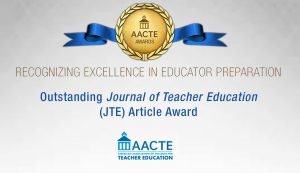
The Outstanding Journal of Teacher Education Article Award is presented annually by AACTE to recognize exemplary scholarship published in the Journal of Teacher Education (JTE) during the last volume year. The journal’s editors, based at Michigan State University, nominate several top articles for consideration, and the AACTE Committee on Research and Dissemination selects the winning paper to receive the award. This award represents one of the nine categories of the annual AACTE Award Program that recognizes excellence in educator preparation.
In the video below, JTE Co-Editor Robert Floden highlights the 2018 AACTE Outstanding Journal of Teacher Education Article Award winner, “Capturing the Complex, Situated, and Active Nature of Teaching Through Inquiry-Oriented Standards for Teaching.” In this article, the authors, Claire Sinnema, Frauke Meyer, and Graeme Aitken of the University of Auckland, identify problems in the design and implementation of teaching standards that widen the divide between theory and practice, and propose an alternative model dubbed Teaching for Better Learning.
26 Sep2019
By Govinda Budrow
The excerpt below is taken from an article originally published on the American Indian College Fund website and is reprinted with permission.

When it comes to STEM, it may be the roots that hold us in the field, the classroom, and in our love for science, technology, engineering, and mathematics.
As Native Americans, there has been a complicated history and relationship with formalized education. Beginning with boarding schools and day schools that mandated assimilation and rejection of Indigenous community languages and wisdom, the disruption has spanned for well over a century, with the abusive boarding school era coming to a close as late as the 1970s. Each generation since these boarding schools struggles with the false dichotomy that one can either be Indigenous or do well in school.
26 Sep2019
By Jerrica Thurman
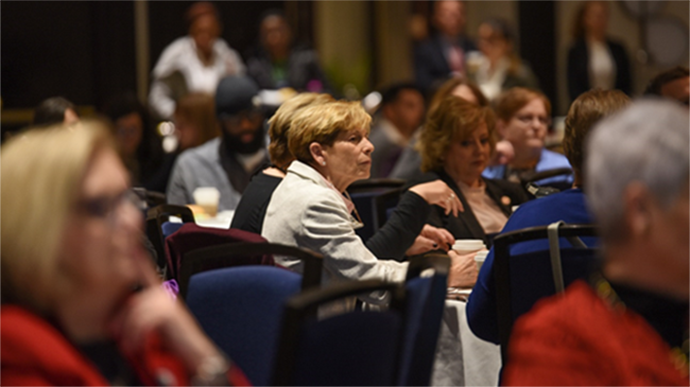
AACTE’s engaging concurrent sessions, known as Learning Labs, are returning to the 2020 Annual Meeting in Atlanta, GA. As an attendee from last year noted, “The practical sessions with actual implementation stories stood out as exemplary.” In the Learning Labs you too will receive inspiring content and tangible practices to implement in your daily work.
Come experience these enhanced sessions, categorized by these types:
- Case Stories sessions feature quality storytelling designed to illuminate real world case studies that demonstrate innovation or breakthrough practices.
- Data to Action sessions release recent data in ways that encourage attendees to discuss its relevance and practicality in everyday settings.
- Future Casting sessions explore the creation of “next practices” as opposed to and/or in addition to exploring current best practices.
- Paper Sessions feature two presentations focused on a similar topic centered around the event strands.
- Perspectives sessions address a current topic or concern that is germane to educator preparation framed as a research, policy, or program question.
- Roundtables sessions focus on a particular topic and are led by an individual or a small group.
- Scenario Planning sessions help attendees consider and discuss a variety of actions that might take place as a result of changing conditions.
AACTE continues to elevate the quality of its educational offerings and attendee engagement at its Annual Meeting. Come experience the reimagined offerings at the AACTE 72nd Annual Meeting, February 28 – March 1. Register now and take advantage of early bird rates by October 30. Visit aacte.org for conference details, follow us on Twitter and Facebook, and join the conversation using #AACTE20.

Do you have questions or need assistance? Please email events@aacte.org.
26 Sep2019
By Michael Staton
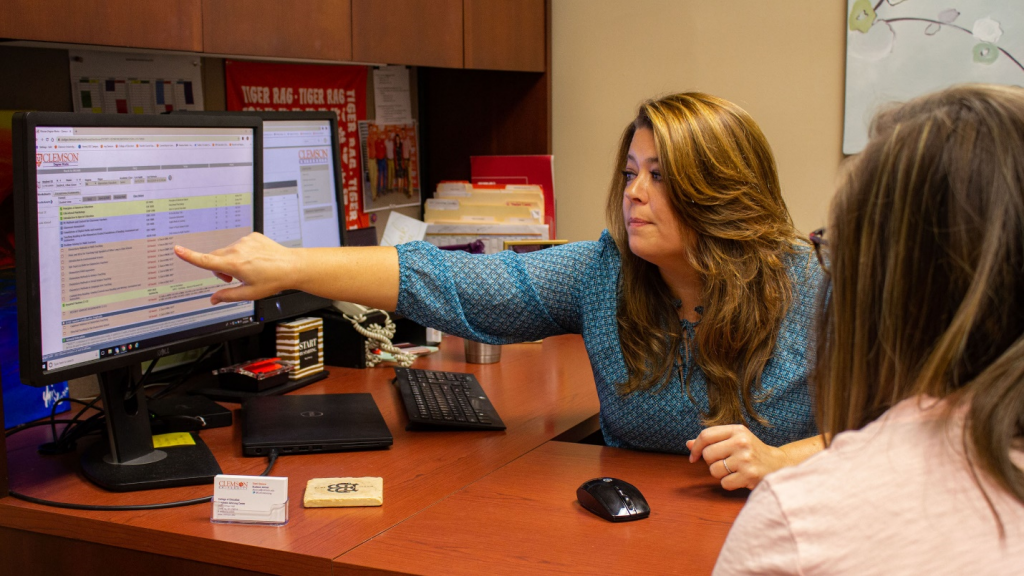 This article originally appeared in the Clemson University Newstand and is reprinted with permission.
This article originally appeared in the Clemson University Newstand and is reprinted with permission.
This fall, Clemson’s College of Education has become the first on campus to adopt a college-wide, four-year advising model for its undergraduates. College leadership and student advisors worked collaboratively to develop this approach, which they say aligns the college more closely with the Clemson Forward strategic plan.
This model positions academic advisors to manage all tasks related to student scheduling and degree completion, while faculty members become involved once students transition to the professional level of their respective program area. According to Michelle Cook, associate dean for undergraduate studies in the college, the move will be a true “win-win” for faculty, staff and students in the college as well as the college’s partner school districts.
“Our college prides itself on the personal attention we
26 Sep2019
By Ana-Maria Gutierrez
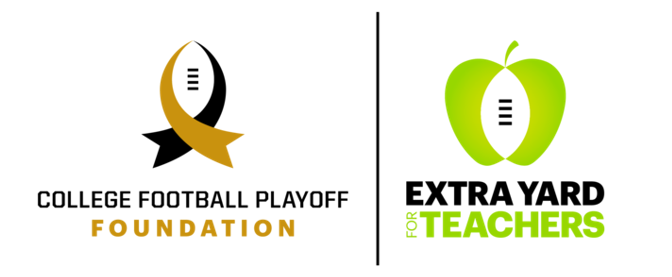
AACTE is partnering with the College Football Playoff (CFP) Foundation program, Extra Yard for Teachers, a platform to elevate the teaching profession using the high profile of college football through four pillars: resources, recognition, recruitment, and professional development.
Through the four pillars, the CFP Foundation supports early childhood through secondary education across the country by sponsoring a number of activities. These activities include donating money directly into classrooms for supplies; sponsoring “Extra Yard for Teachers Week” during which universities, conferences, and the ESPN sports channel come together to celebrate teachers across the country; and convening the Extra Yard for Teachers Summit to empower and inspire educators.
To keep up to date on the ongoing CFP Foundation programs and special events that support teachers, AACTE members can subscribe to The Extra Yard official eNewsletter. Learn more about the organization and how it impacts positive educational outcomes, visit cfp-foundation.org.
24 Sep2019
By Ana-Maria Gutierrez
 Research has shown high-quality principals play a key role in the effectiveness of public schools and are second only to teachers in their impact on student achievement. The development of a principal’s leadership skills and disposition is critical to their effectiveness as a school leader. Educational leadership programs across the country are working to improve their programs and prepare principals for the challenges school leaders face today. AACTE invites you participate in an upcoming webinar series, developed in partnership with the Wallace Foundation and focused on research that highlights the role of building the principal pipeline, university and district partnerships, educational leadership tracking systems, and standards for ensuring high-quality preparation programs. Each webinar will be followed by a corresponding Twitter chat for a chance to ask more in-depth questions of the presenters and keep the conversation going.
Research has shown high-quality principals play a key role in the effectiveness of public schools and are second only to teachers in their impact on student achievement. The development of a principal’s leadership skills and disposition is critical to their effectiveness as a school leader. Educational leadership programs across the country are working to improve their programs and prepare principals for the challenges school leaders face today. AACTE invites you participate in an upcoming webinar series, developed in partnership with the Wallace Foundation and focused on research that highlights the role of building the principal pipeline, university and district partnerships, educational leadership tracking systems, and standards for ensuring high-quality preparation programs. Each webinar will be followed by a corresponding Twitter chat for a chance to ask more in-depth questions of the presenters and keep the conversation going.
The first webinar in the series will kick off in October to coincide with National Principals Month. It will focus on the challenges and successes of principal recruitment and retention. Recruiting and retaining highly effective principals is an ever-growing
23 Sep2019
By Jane E. West
 The Office of Special Education Programs of the U.S. Department of Education (DOE) has developed an initiative called “Attract, Prepare and Retain Effective Personnel.” They have requested feedback from the field. Specifically, the invitation states:
The Office of Special Education Programs of the U.S. Department of Education (DOE) has developed an initiative called “Attract, Prepare and Retain Effective Personnel.” They have requested feedback from the field. Specifically, the invitation states:
“We invite you to share your thoughts on how we can best support States in their work to Attract, Prepare, and Retain Effective Personnel. Sharing your challenges and successes can make a difference for others facing similar challenges.”
The deadline for submitting comments is September 30, 2019. Learn more.
23 Sep2019
By Jane E. West

This blog post is written by AACTE consultant Jane West and is intended to provide update information. The views expressed in this post do not necessarily reflect the views of AACTE.
Congress was engaged in a frenzy of appropriations activities last week … where it will all lead remains to be seen!
With the End of the Fiscal Year in Sight, Congress Punts
September 30—the end of the federal Fiscal Year—is looming, and Congress is getting edgy. Seeing that there is no way to resolve differences in all of the spending bills in that timeframe, Congress has moved to postpone the showdown. The House passed a Continuing Resolution to keep all government funding at current levels through November 21. The Senate is expected to pass it next week and the President is expected to sign it. On November 22, the challenges will remain.
Meanwhile, several of the 12 individual funding bills are moving through the Senate Appropriations process. You will recall that last week the markup of the Labor/HHS/Education funding bill was suddenly canceled. This week, the Senate Appropriations Committee did not move that bill forward, but they did release both the text of their bill, a summary and the Committee report. Links are below.
23 Sep2019
By Jane E. West

This blog post is written by AACTE consultant Jane West and is intended to provide update information. The views expressed in this post do not necessarily reflect the views of AACTE.
Congress was engaged in a frenzy of appropriations activities last week … where it will all lead remains to be seen!
With the End of the Fiscal Year in Sight, Congress Punts
September 30—the end of the federal Fiscal Year—is looming, and Congress is getting edgy. Seeing that there is no way to resolve differences in all of the spending bills in that timeframe, Congress has moved to postpone the showdown. The House passed a Continuing Resolution to keep all government funding at current levels through November 21. The Senate is expected to pass it next week and the President is expected to sign it. On November 22, the challenges will remain.
Meanwhile, several of the 12 individual funding bills are moving through the Senate Appropriations process. You will recall that last week the markup of the Labor/HHS/Education funding bill was suddenly canceled. This week, the Senate Appropriations Committee did not move that bill forward, but they did release both the text of their bill, a summary and the Committee report. Links are below.
23 Sep2019
By Kim Metcalf
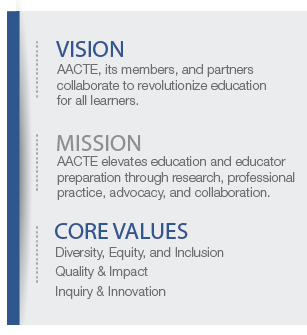 As we settle in to a new academic year, it’s a particularly opportune time to update you on the work the Board of Directors has been doing on your behalf.
As we settle in to a new academic year, it’s a particularly opportune time to update you on the work the Board of Directors has been doing on your behalf.
I am fortunate to collaborate with an exceptional group of leaders on the AACTE Board of Directors. They serve the Association in so many ways: as ambassadors for AACTE and for our profession, as liaisons to our Standing Committees, as officers on the Executive Committee, and as chairs and members of Board task forces addressing key issues, among many other activities. I want to thank each and every one of them for their hard work and dedication.
Already this year, the Board has taken a number of significant steps. In June, the Board approved new vision, mission, and core value statements for the Association as part of an ongoing board-led, member-informed strategic planning process. This plan reinforces the Association’s role in serving to promote advancement and innovation in educator preparation. Special thanks to Michael Dantley, who led this work, and to the members of the Strategic Planning Task Force for engaging in this process.
20 Sep2019
By Lynn M. Gangone
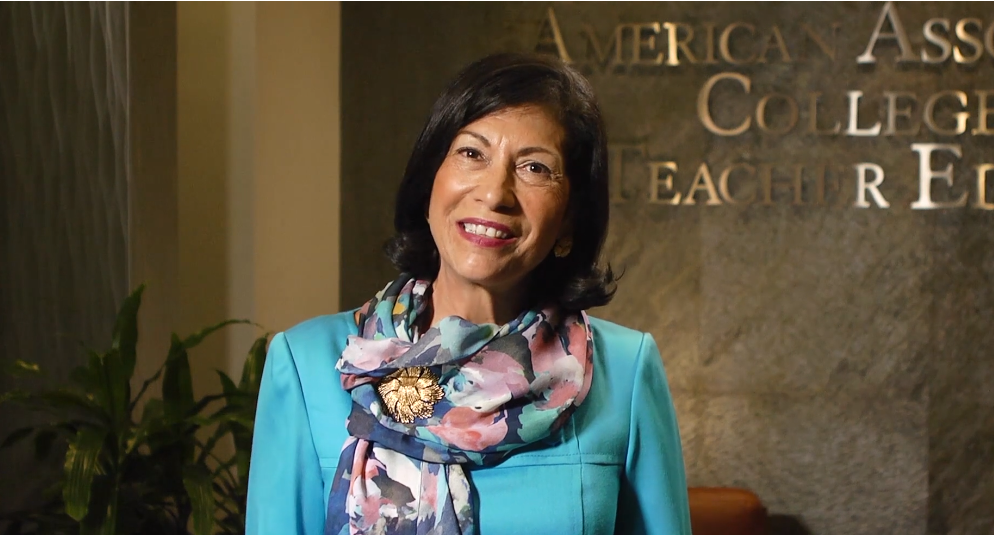
America is a country of immigrants. Through each wave of immigration, our public schools incorporate immigrant children into the fabric of our country. Our public schools serve as a cultural incubator to aid and nurture acceptance of diversity. Our local classrooms should be a microcosm of a global demographic. We, as educators, need to harness that belief for our teachers and the students they teach and guide.
How do America’s immigration challenges impact schools?
The challenge is that there are undocumented students entering U.S. schools, colleges, and universities who were not given the option to decide for themselves whether they wanted to come to this country. They have been incorporated into society, but are affected by current practices that impact their safety and security. It is projected that by the year 2040, one in every three children in the United States will grow up in an immigrant household (Suárez-Orozco, Suárez-Orozco, & Todorova, 2008). It begs the question: How do we work with those students?
Educators, school support staff, and service providers are often the first individuals in whom a student and/or family confides and reveals that they are undocumented. Recent efforts to identify undocumented parents and children in the United States challenge public schools in their efforts to meet the needs of all children residing within their school districts. Public schools are often embroiled in politically and legally sensitive situations, in which they must balance their responsibilities to serve immigrant and undocumented children, while meeting the expectations of local authorities to identify undocumented individuals.
What role do educators play in supporting immigrant children and their families?
20 Sep2019
By Renee Rybak Lang
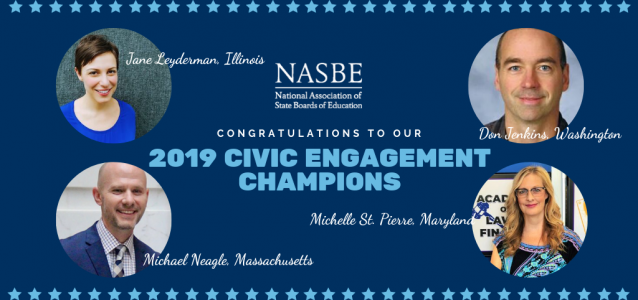
The AACTE Programs and Professional Learning team served on the committee to select the following inaugural Civic Engagement Champions with the National Association of State Boards of Education and the Frank Islam Institute.
Four middle school teachers have been named Civic Engagement Champions (CEC) for their work in promoting civics education and active citizenship.
In partnership with the Frank Islam Institute for 21st Century Citizenship (FII), the National Association of State Boards of Education (NASBE) created the CEC award to highlight the critical role that middle school teachers play in helping students become active, responsible citizens. Teachers from four states representing each of NASBE’s regions—Illinois, Massachusetts, Maryland, and Washington—were eligible to apply.
The four winners are Jane Leyderman, Dever Elementary School in Chicago, IL; Michael Neagle, Pyne Arts Magnet School in Lowell, MA; Michelle St. Pierre, Loch Raven Technical Academy in Baltimore County, MD; and Don Jenkins, North Whidbey Middle School in Oak Harbor, WA.
19 Sep2019
By Kimberly Underwood

This article and photo originally appeared in EdSurge and are reprinted with permission.
Two percent. That figure may seem insignificant, until you understand the context. Despite students of color representing more than half the student population, Black males make up only two percent of the teacher workforce. So as it happens, that statistic is very significant as this lack of diversity has negative implications for all students.
For years, Black males have been underrepresented in PK-12 education. While there have been many efforts to diversify classrooms by adding more Black male educators, there are still obstacles preventing us from successfully reaching this goal. Now these educators are speaking up and their voices are sounding the alarm for education diversity.
For years, Black males have been underrepresented in PK-12 education.
19 Sep2019
By Jerrica Thurman
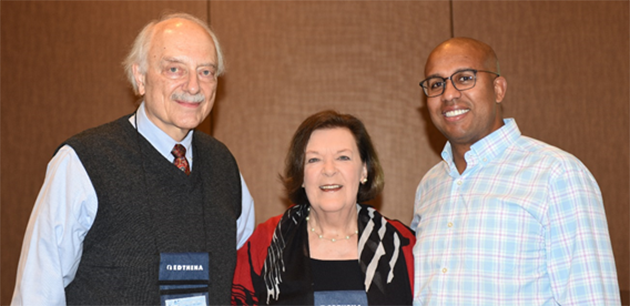
The AACTE Annual Meeting consistently earns high attendee ratings. More than 90% of the 2019 attendees ranked the conference and its content quality as “Good” or “Excellent,” and said they would recommend it to their colleagues. Some of the top benefits participants cite are the value of learning and networking with like-minded professionals. Here is what attendees had to say:
“I love the Annual Meeting. The people are great, the sessions are generally strong, and I really appreciate the focus on taking ownership of education policy making.”
“I really appreciated the time to connect with peers doing this work and to hear about the ways in which we can continue to move the needle to a practice-based curriculum.”
“I enjoyed talking with all the vendors and making decisions about products to implement at our university.”
“I find the sessions useful and the networking is always great. [The event is] very important for gaining new information and perspective and [for] professional networking.”
Join colleagues from across the nation at the premier conference for teacher educators — AACTE’s 72nd Annual Meeting, February 28 – March 1, 2020. Register and take advantage of early bird rates by October 30.
Visit aacte.org for conference details, follow us on Twitter and Facebook, and join the conversation using #AACTE20.

For additional assistance, please contact us at events@aacte.org
18 Sep2019
By Danny Ryan

The Organization for Economic Co-operation and Development’s (OECD) work on education helps individuals and nations to identify and develop the knowledge and skills that drive better jobs and better lives, generate prosperity, and promote social inclusion.
Access to OECD Education data
Through the OECD data portal, educators can cross-reference data on teacher’s salaries, graduation rates, education spending, and much more. All data is available to download for free.
For example, are you curious about how education policies support students, teachers, and principals? The OECD’s new Education Policy Outlook reports on the progress of over 200 school improvement policies implemented over the last 10 years.
School and University leaders will find a treasure trove of information within the OECD Teaching and Learning International Survey (TALIS), which asks teachers and school leaders about working conditions and learning environments at their schools to help countries face diverse challenges.
For those wanting further OECD insight, the OECD iLibrary contains nearly 20,000 content items related to education. Content on the platform is accessible to all by clicking the READ or WEB icon. Certain features and access is restricted to intuitions that have a subscription. Find out if your institution is an existing subscriber.











 This article originally appeared in the
This article originally appeared in the 
 Research has shown high-quality principals play a key role in the effectiveness of public schools and are second only to teachers in their impact on student achievement. The development of a principal’s leadership skills and disposition is critical to their effectiveness as a school leader. Educational leadership programs across the country are working to improve their programs and prepare principals for the challenges school leaders face today. AACTE invites you participate in an upcoming webinar series, developed in partnership with the Wallace Foundation and focused on research that highlights the role of building the principal pipeline, university and district partnerships, educational leadership tracking systems, and standards for ensuring high-quality preparation programs. Each webinar will be followed by a corresponding Twitter chat for a chance to ask more in-depth questions of the presenters and keep the conversation going.
Research has shown high-quality principals play a key role in the effectiveness of public schools and are second only to teachers in their impact on student achievement. The development of a principal’s leadership skills and disposition is critical to their effectiveness as a school leader. Educational leadership programs across the country are working to improve their programs and prepare principals for the challenges school leaders face today. AACTE invites you participate in an upcoming webinar series, developed in partnership with the Wallace Foundation and focused on research that highlights the role of building the principal pipeline, university and district partnerships, educational leadership tracking systems, and standards for ensuring high-quality preparation programs. Each webinar will be followed by a corresponding Twitter chat for a chance to ask more in-depth questions of the presenters and keep the conversation going. The Office of Special Education Programs of the U.S. Department of Education (DOE) has developed an initiative called “Attract, Prepare and Retain Effective Personnel.” They have requested feedback from the field. Specifically, the invitation states:
The Office of Special Education Programs of the U.S. Department of Education (DOE) has developed an initiative called “Attract, Prepare and Retain Effective Personnel.” They have requested feedback from the field. Specifically, the invitation states:
 As we settle in to a new academic year, it’s a particularly opportune time to update you on the work the Board of Directors has been doing on your behalf.
As we settle in to a new academic year, it’s a particularly opportune time to update you on the work the Board of Directors has been doing on your behalf.



